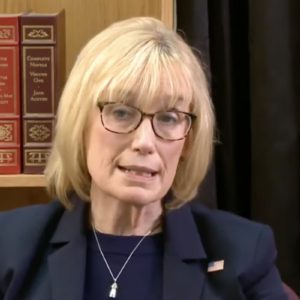More than three years after President Joe Biden signed off on a $1.2 trillion infrastructure bill that directed a whopping $42.5 billion to expand rural broadband access nationwide, the windfall of federal tax dollars has yet to connect a single Granite Stater to the internet.
And yes, with Biden’s time in the White House coming to an end, New Hampshire Democrats like U.S. Sen. Maggie Hassan continue to tout the project even as it languishes.
“In the 21st century, high-speed internet access is not a luxury – it’s a necessity,” Hassan posted on social media Monday. “New Hampshire is receiving $4.9 million in funding from the bipartisan infrastructure law that will help our state build out more internet connections in rural areas and specifically for seniors.”
It’s just one slice of the $200 million in total federal funding earmarked for New Hampshire in 2021 for rural broadband expansion. But after years of promises and millions in spending, the total number of rural Granite Staters or local seniors who are actually connected to high-speed internet from the effort remains zero.
Other noteworthy updates (and their corresponding dates) from Hassan regarding the broadband project include:
“Telehealth services have revolutionized health care—but too often, our rural communities are left behind as limited broadband restricts their access to health care. I’m determined to change that.” (May 19, 2021)
“In today’s economy, broadband isn’t optional—it’s essential. I’m working to ensure that every household in New Hampshire is connected.” (May 22, 2021)
“Glad to have a partner like @VP Harris to work with to expand broadband in New Hampshire.” (Aug. 23, 2021)
“Our new federal funding is on its way to helping more New Hampshire families get online.” (Dec. 8, 2022)
“I helped negotiate the bipartisan infrastructure law that is providing this funding because broadband is key to the success of our state.” (June 26, 2023)
“The bipartisan infrastructure law is continuing to deliver for New Hampshire.” (Sept. 6, 2023)
New Hampshire taxpayers, however, have known for years that the state is in line to receive the nearly $5 million federal rural broadband package, thanks to press releases from Hassan and her fellow Democrat, U.S. Sen. Jeanne Shaheen.
It was Shaheen who proudly took credit for “writing the broadband provisions that created the BEAD (Broadband, Equity, Access, and Deployment) program. Shaheen has frequently touted her role as “the Democratic negotiator on broadband provisions in the historic bipartisan infrastructure law.”
Both Shaheen and Hassan have declined repeated requests from NHJournal to comment on the BEAD program’s standstill.
In April 2021, Biden announced he was assigning the task of achieving universal high-speed internet access to Vice President Kamala Harris.
In August, Americans for Tax Reform (ATR) published a report examining Harris’ role as “point person” for the Biden administration’s broadband efforts. The ATR report determined the BEAD program “requires that most of the work be completed within five years of the law taking effect, meaning most of the projects to reach rural, unserved areas will blow past that deadline at the current pace.”
Brendan Carr — the senior Republican official serving on the Federal Communications Commission — blamed the lack of progress on progressive politics and a “liberal wish list” of far-left mandates. President-elect Donald Trump has tapped Carr to become the next FCC chairman.
Carr warned when the Shaheen-written legislation was passed that the Biden administration’s emphasis on meeting “woke” targets like diversity, equity, and inclusion initiatives would lead to failure.
“So here’s the bottom line – absent major reforms, the Biden administration’s implementation of this $42 billion BEAD program is wired to fail. It is easy to understand why. Rather than faithfully implementing the statute, the Biden administration has put its thumb on the scale in favor of extraneous political goals that have more to do with ideology than they do with getting people connected,” Carr said.
A copy of the BEAD frequently asked questions manual, produced by the National Telecommunications and Information Administration, mentions the words “equity” 85 times.





